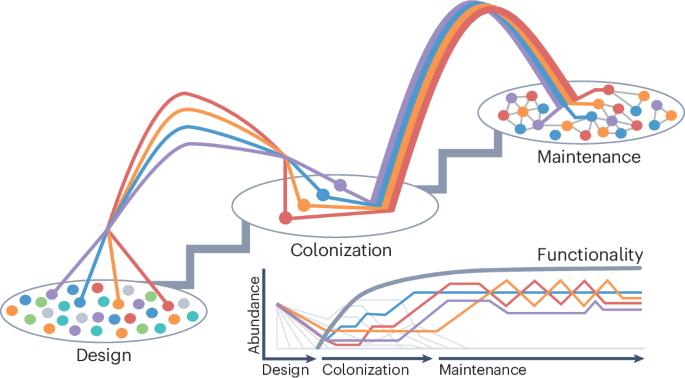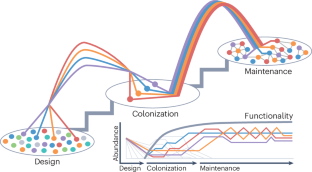将生态学原理应用于微生物组工程
IF 19.4
1区 生物学
Q1 MICROBIOLOGY
引用次数: 0
摘要
微生物组工程旨在重塑微生物群落以改善生态系统功能。然而,由于设计原则不充分,许多努力失败了,往往导致关键微生物的损失和工程群落与其预期功能之间的联系中断。相比之下,几十年的宏观生态学研究已经揭示了生物多样性和生态系统功能之间关系的关键原则。在这里,我们将这些生态原理转化为微生物组工程,重点关注三个阶段:微生物组设计,定植和维护。我们提出了新的方法,利用潜在的生态动力学-特别是生态位动力学-来优化多样性和丰度,以促进稳定性和功能,特别是在宿主相关的微生物群中。我们还强调了将宏观生态系统的见解应用于微生物系统的关键研究重点。以这种方式改进微生物组工程有望解决医学和农业中的紧迫挑战,同时提供对维持生物尺度上生物多样性的生态过程的理解。本文章由计算机程序翻译,如有差异,请以英文原文为准。


Applying ecological principles to microbiome engineering
Microbiome engineering seeks to reshape microbial communities to improve ecosystem function. However, many efforts fail due to inadequate design principles, often resulting in a loss of key microorganisms and disruption of links between the engineered community and its intended function. In contrast, decades of research in macroecology have uncovered key principles governing the relationship between biodiversity and ecosystem function. Here we translate these ecological principles to microbiome engineering, focusing on three stages: microbiome design, colonization and maintenance. We propose new approaches that leverage underlying ecological dynamics—particularly niche dynamics—to optimize diversity and abundance to promote stability and functionality, especially in host-associated microbiomes. We also highlight key research priorities to apply macro-ecosystem insights to microbial systems. Improving microbiome engineering in this way holds promise for solving pressing challenges in medicine and agriculture, while providing understanding of ecological processes that maintain biodiversity across biological scales. This Perspective discusses the application of ecological principles of macro-ecosystems to microbiome engineering. The authors propose research priorities necessary to facilitate the application of these ecological principles to improve microbiome functionality.
求助全文
通过发布文献求助,成功后即可免费获取论文全文。
去求助
来源期刊

Nature Microbiology
Immunology and Microbiology-Microbiology
CiteScore
44.40
自引率
1.10%
发文量
226
期刊介绍:
Nature Microbiology aims to cover a comprehensive range of topics related to microorganisms. This includes:
Evolution: The journal is interested in exploring the evolutionary aspects of microorganisms. This may include research on their genetic diversity, adaptation, and speciation over time.
Physiology and cell biology: Nature Microbiology seeks to understand the functions and characteristics of microorganisms at the cellular and physiological levels. This may involve studying their metabolism, growth patterns, and cellular processes.
Interactions: The journal focuses on the interactions microorganisms have with each other, as well as their interactions with hosts or the environment. This encompasses investigations into microbial communities, symbiotic relationships, and microbial responses to different environments.
Societal significance: Nature Microbiology recognizes the societal impact of microorganisms and welcomes studies that explore their practical applications. This may include research on microbial diseases, biotechnology, or environmental remediation.
In summary, Nature Microbiology is interested in research related to the evolution, physiology and cell biology of microorganisms, their interactions, and their societal relevance.
 求助内容:
求助内容: 应助结果提醒方式:
应助结果提醒方式:


